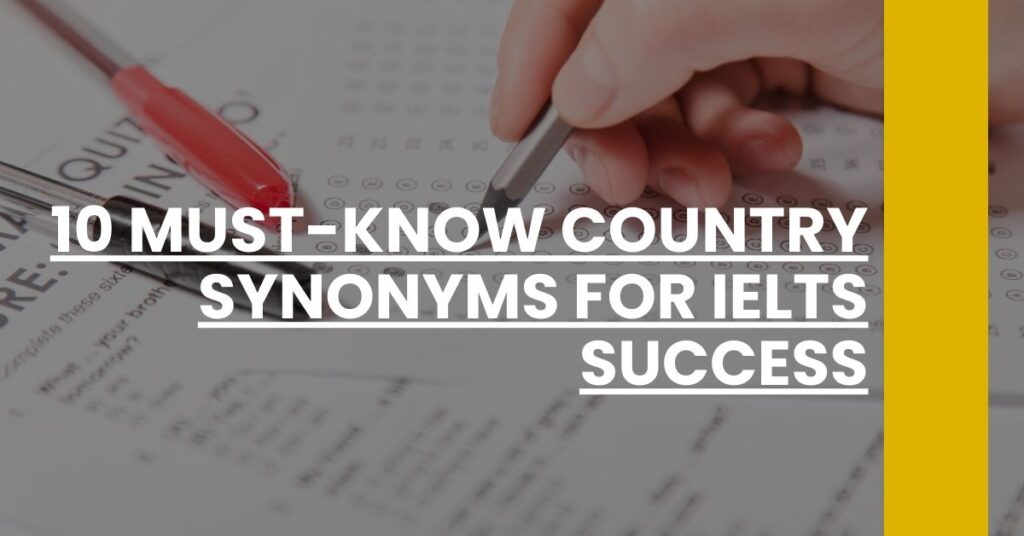Struggling to creatively express “country” in your next IELTS essay?
Master the art of language variation with these key country synonyms for IELTS—synonyms that paint a vivid picture of nations and their intricate qualities, equipping you with a polished vocabulary that can make all the difference in your score.
- 1. Nation: The Cornerstone of Political Vocabulary
- 2. State: More Than Just a Province
- 3. Republic: A Government Form Synonym
- 4. Kingdom: When to Use This Royal Term
- 5. Territory: Geography-Oriented Synonym
- 6. Commonwealth: The Formal Association
- 7. Sovereignty: A Synonym with Clout
- 8. Domain: Broadening Your Descriptive Range
- 9. Region: For a Less Formal Synonym
- 10. Federation: A Collective Term
- Vocabulary Building Strategies
- Understanding IELTS Contextual Nuances
- Say It Like a Local: Idioms and Phrases
- Conclusion: Wrapping Up Your Lexical Journey
1. Nation: The Cornerstone of Political Vocabulary
When it comes to country synonyms for IELTS, ‘nation’ is perhaps the first word that comes to mind. It’s a term often used when referring to large groups of people united by common descent, history, culture, or language, inhabiting a particular country or territory. It’s a concept filled with cultural richness and historical significance, and it hints at the shared heartbeat of its populace more than the geographical boundaries that define it.
For your IELTS journey, incorporating ‘nation’ instead of ‘country’ can lend an air of formality and depth, especially in tasks related to socio-political issues. It’s a keyword that can underscore the collective identity over individualistic implications. When discussing topics like national heritage, tradition, or the arts, reaching for ‘nation’ raises the level of your discourse to a more nuanced understanding.
In essence, using ‘nation’ can subtly shift the focus from purely political boundaries to the human elements that make a country palpable and personal.
2. State: More Than Just a Province
While it might be tempting to exclusively associate ‘state’ with American federal units, the term’s application is broader on the global IELTS stage. Internationally, a ‘state’ is recognized as a political community occupying a definite territory, endowed with an organized government, and sovereignty recognized by the outside world.
In the throes of your IELTS prep, distinguish between its two main usages:
- Domestic Context: When talking about internal divisions (for instance, the states of India or Germany).
- International Arena: When referring to a country as a member of the global community (United Nations member states, for example).
When discussing matters of diplomacy, international law, or governance, slotting in ‘state’ enriches your argument with clarity and specificity. It conveys a balance of power and the image of an entity that participates in international relations.
3. Republic: A Government Form Synonym
Looking for a term that conveys a specific type of governance within your IELTS lexicon? Say hello to ‘republic.’ This term describes a state where the public matters are the affair of the people and those they elect to represent them. The focus here lies on the public sphere over royal or autocratic rule.
When defining government structures in your IELTS Writing or Speaking tasks, using ‘republic’ can offer precision:
- Governing Philosophy: Indicates a system where power resides with the people.
- Democratic Principles: Suggests a form of government opposite to a monarchy.
Remember, the key to acing IELTS is not just knowing fancy country synonyms but knowing when and how to use them. ‘Republic’ is ideal for discussions involving political science or comparative politics, where you might contrast different forms of governance.
4. Kingdom: When to Use This Royal Term
In IELTS, precision is your ally, and ‘kingdom’ is the regal synonym that adds a touch of monarchy to your speech or writing. Use this term when addressing countries with a monarchical system in place—where a king, queen, or a form of royalty rules.
Consider this when mapping out your use of ‘kingdom’ for your IELTS responses:
- Historical References: Ideal for talking about periods where monarchies were commonplace.
- Contemporary Contexts: Think about current monarchies, like the United Kingdom or the Kingdom of Saudi Arabia.
‘Kingdom’ adds a layer of cultural and historical context to your discourse, providing a glimpse into the heritage and governance of a nation.
5. Territory: Geography-Oriented Synonym
Now, let’s traverse the landscapes of ‘territory.’ A ‘territory’ refers to a defined piece of land—often without the full rights of statehood. It is under the influence or control of another country, perhaps not yet achieving political autonomy.
This distinction matters in your IELTS toolkit for a couple of reasons:
- Geopolitical Scenarios: Helps you discuss areas under dispute or special administrative regions.
- Colonial History: Useful for dialogues about the remnants of colonialism or protectorates.
Integrating ‘territory’ correctly shows your insight into the nuances of political geography, making you a more informed and engaging communicator.
6. Commonwealth: The Formal Association
The ‘commonwealth’ is a term with the gravitas of history and the formality of diplomatic relations. It typically stands for a political community established for the common good, and it’s also synonymous with a group of countries connected by common ties—like those associated with the British Commonwealth.
The right moment to use ‘commonwealth’ in your IELTS exam could be while:
- Discussing Historical Relations: Detailing the connections countries might share with their past colonial powers.
- Examining Current Alliances: Exploring modern associations such as the Commonwealth of Nations.
Mastering the use of ‘commonwealth’ in your conversations or essays can provide evidence of your in-depth understanding of global kinships.
7. Sovereignty: A Synonym with Clout
In the discussions about country synonyms for IELTS, ‘sovereignty’ is a heavyweight. It refers to the full right and power of a governing body over itself, without any interference from outside sources or bodies. Sovereignty is about authority, control, and autonomy—a pinnacle concept in understanding the workings of nations.
Here’s why ‘sovereignty’ boosts your IELTS responses:
- Depth of Argument: Implies complete independence, a robust standpoint in debates on international relations.
- Political Gravity: In discussions about self-rule, freedom, and government jurisdiction, sovereignty carries immense weight.
By weaving ‘sovereignty’ into your discussions, you articulate a country’s status with clarity—showing that you grasp the delicate balance of power and independence that defines the global tapestry.
8. Domain: Broadening Your Descriptive Range
In your quest for eloquence in the IELTS exam, ‘domain’ might just be the underutilized gem in your vocabulary cache. Though not a direct substitute for ‘country’, this term offers a broadened perspective. A ‘domain’ is an area owned or controlled by a specific ruler or government. In an age where digital realms also speak of domains, understanding its more traditional implications can enrich your language portfolio.
Let’s delve into why ‘domain’ can serve you well:
- Historical Contexts: When discussing the reaches of empires or bygone eras, ‘domain’ evokes the expanse and influence beyond mere borders.
- Authority and Control: It highlights the domain of influence—whether in a discussion about digital governance or the sovereign reach of a state.
Remember to wield ‘domain’ with awareness of its slight regal and authoritative connotations. It’s ideal for painting a picture of scope and reach when discussing the geopolitical landscapes of the past or current global dynamics.
9. Region: For a Less Formal Synonym
The use of ‘region’ in your IELTS arsenal may seem straightforward, but its strategic deployment is anything but. While it might not refer to an independent country, ‘region’ is a versatile term that can denote an extensive area distinguished by specific characteristics. These could be geographical, political, cultural, or even climatic.
Let’s pinpoint when ‘region’ can enhance your IELTS performances:
- Cultural Identity: Regions often carry their own cultural identity that’s ripe for discussion, whether it’s in the context of language, tradition, or cuisine.
- Geopolitical Contexts: Using ‘region’ correctly can demonstrate your grasp of geopolitical subtleties, especially in discussions of regional governance or autonomy movements.
While ‘region’ won’t replace ‘country’ where a sovereign nation is meant, it will prove invaluable when discussing larger-scale areas that encompass multiple countries or speaking to the sense of place and heritage that transcends national borders.
10. Federation: A Collective Term
Finally, in your repertoire of country synonyms for IELTS, don’t overlook ‘federation.’ This term speaks to unity and collective governance, ideal for when you’re addressing a union of states each maintaining a degree of internal autonomy. The Russian Federation or the United States of America embody this concept, where states or entities band together under one federal government.
A federation suggests strength and collaboration, a nuanced addition to your IELTS dialogue. Use it when:
- Describing Unionized Authority: It vividly conveys the idea of collective governance, which could be a central theme in discussions about political arrangements.
- Examining Historical Alliances: Reflecting on the formation of countries through federations can offer a dynamic viewpoint on the formation and evolution of nations.
Appreciating the subtle connotations behind ‘federation’ endows you with the ability to discuss complex government structures thoughtfully and with authority.
Vocabulary Building Strategies
As you continue to hone your linguistic prowess, the incremental collection of country synonyms for IELTS will serve you well. But knowing the words isn’t enough; their robust application is what will ultimately set you apart. Here’s how to layer your learning for the ultimate IELTS preparation:
- Rich Reading Habits: Dive into an assortment of materials, from informative geopolitics articles to cultural commentaries, and immerse yourself in contexts where these synonyms arise organically.
- Contextual Practice: Context is king. Practicing these synonyms within the framework of sentences and essays adapted to IELTS themes ensures they become a natural part of your linguistic toolkit.
- Smart Thesaurus Use: Don’t just replace ‘country’ with synonyms; understand the shades of meaning each one offers by exploring them in a reliable thesaurus.
Remember, vocabulary building is about layering—each new synonym is a hue added to your palette, broadening the shades you can paint your ideas with.
Understanding IELTS Contextual Nuances
Interestingly, the power of your vocabulary is not just in the breadth of your lexicon but in deploying country synonyms for IELTS with finesse. Grasping the contextual nuances means considering the formality of your word choices, the specificity they exact, and the thematic relevance they hold.
For instance, you could use ‘federation’ to show off your political vocabulary or ‘kingdom’ for its cultural resonance. This level of customization doesn’t just display your language skills; it demonstrates your ability to think critically about word choice and its effects on your expression.
Ultimately, a nuanced understanding of these terms can lend sophistication to your speaking and writing, marking you as a candidate of distinction.
Say It Like a Local: Idioms and Phrases
To speak a language well is to weave in the tapestry of its idioms. For the IELTS Speaking section, in particular, the occasional idiomatic expression sprinkled into your conversation can add a dash of authenticity and demonstrate your comfort with English. Consider expressions like ‘melting pot’ for cultures integrating within a nation or ‘from sea to shining sea’ to emphasize vast geography.
Employ idioms judiciously and where they naturally fit. Overuse or misuse can come across as forced or confuse the message you’re trying to convey. And remember, the aim is to enhance communication, not to overshadow your main points with overly colorful language.
Conclusion: Wrapping Up Your Lexical Journey
As you arm yourself with country synonyms for IELTS, remember that variety is the spice of language as much as it is of life. Your newfound awareness of the subtle shades within the vocabulary of nations will not only enrich your responses but also demonstrate a level of understanding that goes beyond surface knowledge.
Every word on this list offers a different lens through which to view and articulate the complex concepts of nationhood and governance—use them wisely, and watch your IELTS scores soar.
Boost your IELTS score with essential country synonyms. Enhance vocabulary for speaking and writing with our top synonym picks.

